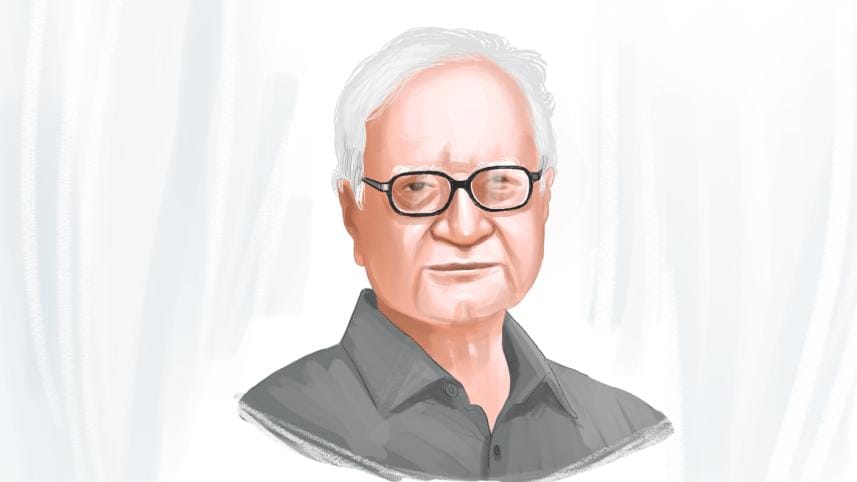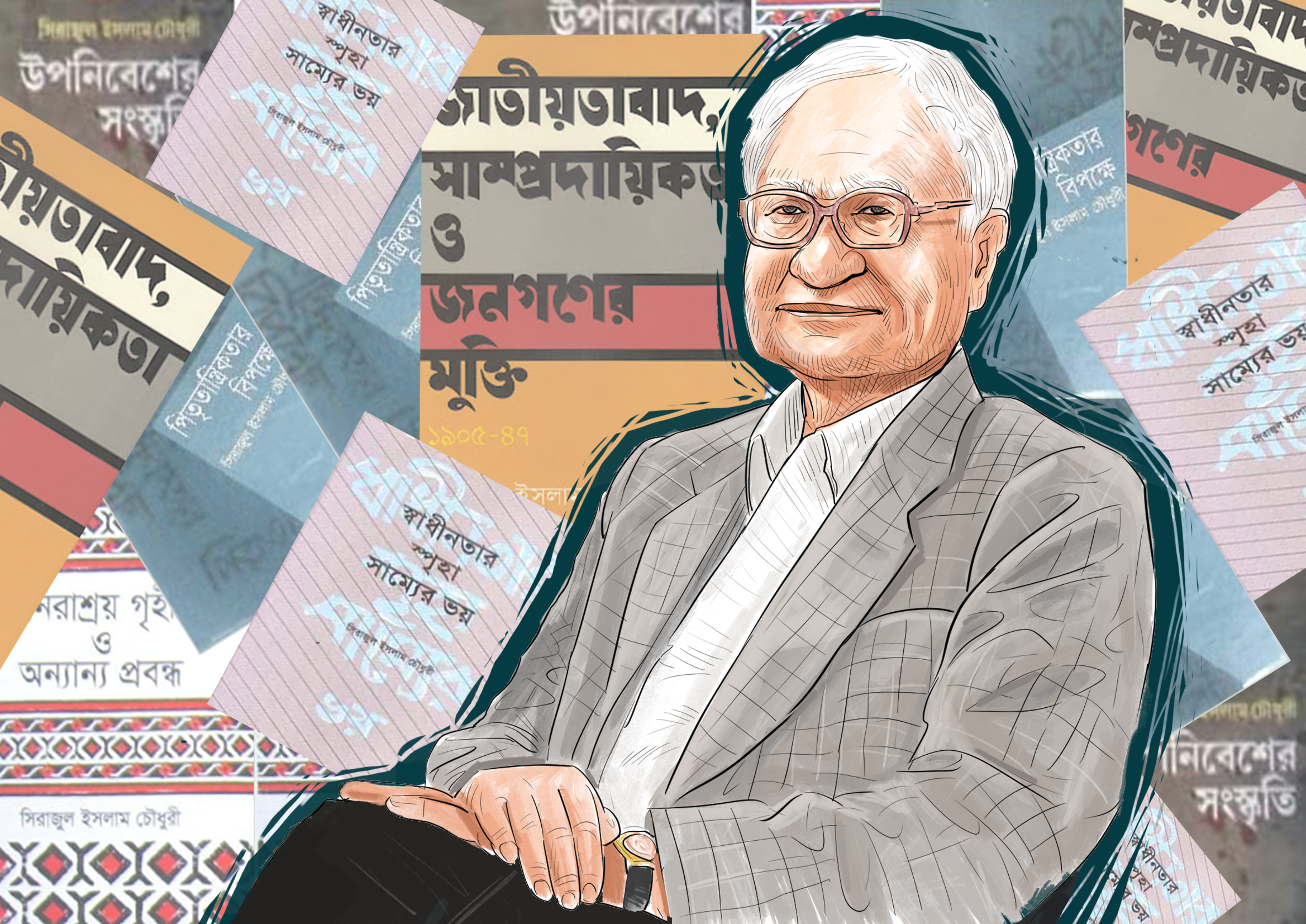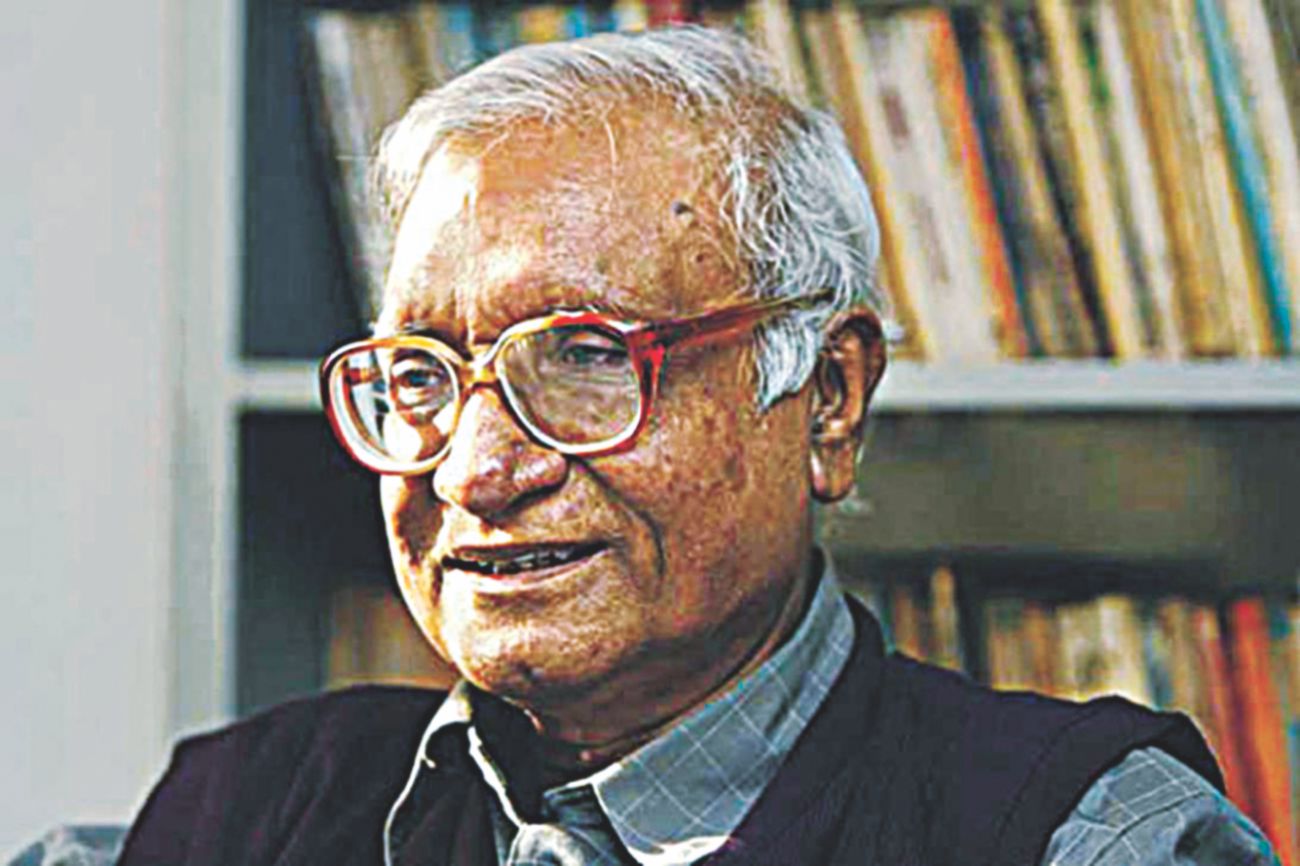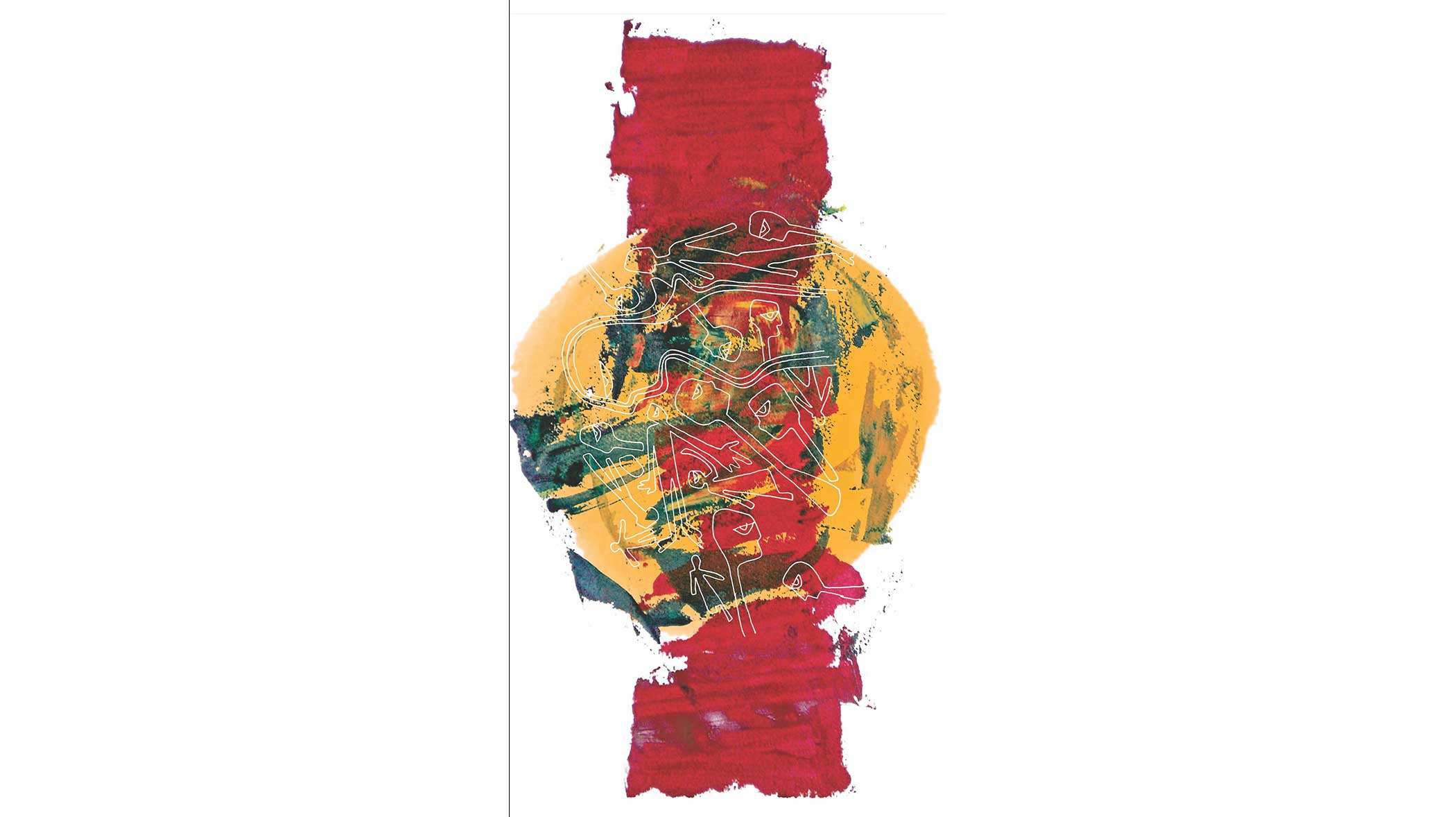Our leading socialist intellectual and our teacher

Today – June 23 – marks the 88th birthday of Serajul Islam Choudhury. Considered our foremost intellectual, literary critic, and essayist in Bangladesh, Choudhury has authored more than a hundred books and countless articles in both English and Bangla, attesting to a breathtaking range of thematic preoccupations and pursuits while encompassing – and interconnecting – such broad areas as literature, culture, history, politics, and even the sociology of the everyday. Thus, Serajul Islam Choudhury has been described as a people's historian, cultural critic, social and media analyst, political analyst, columnist, editor, translator, organiser, and activist. Early on in his life, Choudhury even published three novels and two collections of short stories; although he did not pursue his career as a fiction writer. He has been editing the journal Natun Diganta for some 21 years now. His overall work can be characterised by his relentless opposition to various forms and forces of oppression and injustice, while he has consistently advanced – in the Marxist tradition – the cause of human emancipation in his work.
And, of course, Choudhury is widely acclaimed as a committed, erudite, exemplary teacher, for whom the praxis of teaching is love and labour made visible. Inspiring stories of his pedagogical performance, his phenomenal eloquence, and his proverbial punctuality continue to circulate in circles ranging even beyond academia. It's not for nothing that the Ethics Society of Bangladesh honoured Serajul Islam Choudhury as the best teacher of Dhaka University (DU), while the poet and playwright Syed Shamsul Haq once went to the extent of calling Serajul Islam Choudhury "our nation's teacher!" Indeed, it makes me immensely happy to say that I worked closely with him, remaining associated with the weeklies he edited in the 1990s, while I was his direct student in the English department of DU, where he has taught for about five decades and where he is currently emeritus professor. In his courses, Choudhury introduced us to a remarkable constellation of Russian and English novelists that included Tolstoy, Conrad, Forster, and Lawrence, among others – exemplarily teaching us that literature, as a signifying and sensuous practice, enacts the dialectic of the word and the world in aesthetically special and ideologically and politically suggestive ways that inform, influence, and inspire humanity.
Over the years, I've written about different aspects of Choudhury's critical work and even his transformative pedagogy, profoundly interconnected as they are. But, in this short piece, I intend to dwell on the significance of Serajul Islam Choudhury as an intellectual. I also intend to touch on a few areas of his interventions in the fields of literary and cultural criticism to account for his significance. Like his contemporaries Noam Chomsky and Edward Said, Serajul Islam Choudhury wrote considerably about the roles and responsibilities of intellectuals themselves. According to him, the role of an intellectual cannot be reduced to that of a specialist. For Choudhury, then, an intellectual is interested in everything – one who tirelessly investigates and interrogates the world and produces transformative knowledge. But that is not all. As Choudhury further contends in his by-now-classic piece called Buddhijbeer Kaajkormo o Daaydayitto (The Activities and Responsibilities of Intellectuals), intellectuals share their knowledge with the public, while also questioning the existing order of things or the status quo with the very objective of changing it. For Choudhury, then, Karl Marx's famous eleventh thesis on Feuerbach – "The philosophers have only interpreted the world, in various ways; the point is to change it." – also continues to guide and govern the "becoming-and-being" of an intellectual, characteristically committed as s/he is to human emancipation.
Serajul Islam Choudhury's role as an intellectual remains organically tied to his role as a literary and cultural critic. His massive work of literary criticism involves not only Bangla literature but also English literature and what is loosely called "World Literature."
Now, Serajul Islam Choudhury's own contentions surrounding the roles of intellectuals are applicable to Choudhury himself. As an intellectual, Choudhury – in his work – continues to challenge, confront, and combat such systems of oppression as capitalism, imperialism/colonialism, communalism, and patriarchy, while demystifying or demonstrating how they affect the practice of everyday life in a language that is immensely readable and even movingly beautiful, and thus making the point that the question of style for an intellectual is not merely an aesthetic one but decisively a political question. But, as an intellectual, Choudhury also significantly worlds the word: he boldly took to the streets while taking part in a number of people's progressive movements in the country. One can readily mention the famous Osmani Uddyan Rakkhya Andolon and the Lalon Akhra Rakkhya Andolon – movements to which Choudhury provided dynamic leadership. Then, in 2019, at the age of 84, Choudhury – along with others (including me) – revived and re-founded Professor Ahmad Sharif's (1921-1999) activist organisation of socialist intellectuals called Samajtantrik Buddhijeebee Sangha – a remarkable move at a notoriously anti-socialist conjuncture in the country.
Given that Choudhury is a combative intellectual, the problems and struggles of common, ordinary people remain at the heart of his overall work. Although he is noted for his extraordinary critical examination of the Bangladeshi middle class – exemplified particularly, if not exclusively, in his English book called Middle Class and the Social Revolution in Bengal: An Incomplete Agenda (2002) – he never conflates "people" with the middle class as such, as has been the case with many writers and politicians in Bangladesh. For him, then, "people" come to include the toiling masses – peasants and workers – or "people" come to include what the Caribbean anticolonial revolutionary Frantz Fanon once called "the wretched of the earth" that would include – in the context of Bangladesh – women and indigenous peoples, including ethnic, linguistic, and religious minorities. It is characteristic of Choudhury to pay attention to what is left out or what is rendered invisible in history, and thus to the neglected, the marginalised, the downtrodden, and the oppressed, while he always radically redefines democracy itself – to use his own words – as "the equality of rights and opportunities." Choudhury has written at least six books that deal with the topic of democracy, while suggesting that there is no socialism without establishing and radicalising democracy itself.
Choudhury almost single-handedly inaugurated a distinctive school of socially and politically engaged literary criticism in Bangladesh, while he also exemplarily expanded the very meaning of culture, placing it in the materialist tradition and reckoning with it politically such that he could instructively discuss our dominant and subjugated political cultures in the country, for instance.
Serajul Islam Choudhury's role as an intellectual remains organically tied to his role as a literary and cultural critic. His massive work of literary criticism involves not only Bangla literature but also English literature and what is loosely called "World Literature." He has proven to be an excellent comparativist – one who revealingly and even stimulatingly compares and makes connections among different literary figures, while underlining both convergences and conflicts at both aesthetic and ideological levels. He has written profusely about such canonical figures in Bangla literature as Vidyasagar, Madhusudan, Bankim, Rabindranath, Sharatchandra, Jibanananda, Nazrul, Buddhodev, among many others. But his criticism is not merely aesthetically evaluative but socially and politically engaged in ways in which literary criticism itself turns out to be a site of the production of emancipatory consciousness, while, of course, Choudhury continues to question the literary establishment at every turn. Among his numerous works, his 1980 book called Unish Shotoker Bangla Goddyer Samajik Byakoron (The Social Grammar of Bangla Prose in the Nineteenth Century) can be cited as a compelling case in point. In fact, Choudhury almost single-handedly inaugurated a distinctive school of socially and politically engaged literary criticism in Bangladesh, while he also exemplarily expanded the very meaning of culture, placing it in the materialist tradition and reckoning with it politically such that he could instructively discuss our dominant and subjugated political cultures in the country, for instance.
There is far more to be said about Serajul Islam Choudhury's significance as an intellectual and literary-cultural critic, but I've only had space to scratch the surface in this piece. In closing, on his 88th birthday, I wish my teacher a long life of continued productivity – a life full of light and laughter and love. And I wish to dedicate to my teacher these beautiful lines by the great revolutionary Guatemalan poet Otto Rene Castillo in their English translation: "The most beautiful thing/ for those who have fought a whole life/ is to come to the end and say:/ we believed in people and life, /and life and the people never let us down."
Indeed, our teacher has fought a whole life, believing in people and in life itself.
Dr Azfar Hussain is currently summer distinguished professor of English & Humanities at the University of Liberal Arts Bangladesh (ULAB). He is director of the graduate programme in social innovation and professor of integrative/interdisciplinary studies at Grand Valley State University in Michigan, US.




 For all latest news, follow The Daily Star's Google News channel.
For all latest news, follow The Daily Star's Google News channel. 


Comments